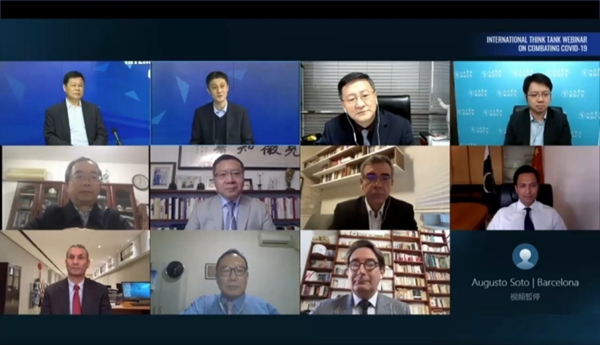
In 1992, after the Cold War ended, 28 individuals established a think tank to suggest new ways for the international community to work collectively for global security.
The Commission on Global Governance presented its report, titled Our Global Neighborhood, at the UN for discussion. Since then, its call to action, urging governments and nongovernmental organizations to adopt international values and work together, has remained pertinent.
On March 26, a similar call was made when the Group of 20 (G20) convened an extraordinary virtual summit to coordinate a multilateral response to the novel coronavirus disease (COVID-19) crisis. At the summit, Chinese President Xi Jinping said it is imperative for the international community to strengthen confidence, act with unity and work together in a collective response.
Extraordinary summit
"We must comprehensively step up international cooperation and foster greater synergy so that humanity as one could win the battle against such a major infectious disease," Xi said.
His call has resonated with international affair analysts. At a webinar on March 30, the speakers stressed the importance of unity, solidarity and consensus in addressing the common challenge facing all countries.
At the Contemporary China and World: International Think Tank Webinar on Combating COVID-19, experts and researchers from six countries discussed the implications of the pandemic and a joint international response.
In his opening remarks at the video conference, Du Zhanyuan, President of the China International Publishing Group (CIPG), said in the face of a common challenge, people need to help each other, not take advantage of others' difficulties. "What we need is win-win cooperation, not lose-lose confrontation," he said.
Du emphasized the role think tanks can play to uphold the vision of a community with a shared future for humanity, oppose the stigmatization and politicization of the disease, and refrain from using the virus for political maneuvering.
Contributing wisdom
"As think tanks, we are duty-bound to be part of the anti-epidemic efforts. We should do more research on the proposals put forward at the G20 leaders' meeting, voice our opinion, and contribute our wisdom and solutions for international cooperation in fighting the outbreak," Du said.
He was referring to the four proposals Xi made at the summit: fighting an all-out global war against COVID-19, making a collective response for control and treatment at the international level, supporting international organizations in playing their roles and enhancing international macro-economic policy coordination.
Specifying the countermeasures that countries can adopt, Xi said they should leverage and coordinate their macro policies to counteract the negative impact of the pandemic and prevent the world economy from falling into recession.
He also mentioned that China would increase its supply of pharmaceutical ingredients, daily necessities, and anti-epidemic and other supplies to the international market.
Xi called on all G20 members to take collective actions—cutting tariffs, removing barriers and facilitating the flow of trade.
Echoing Xi's proposals, the 10 guest speakers at the webinar agreed that the solution to this common challenge for humanity lies in concerted efforts.
Augusto Soto, a professor at ESADE, a private educational institution in Barcelona, Spain, called the crisis "the best example that we share common challenges and a common destiny." However, he pointed out that "unity in action has not yet been reached."
"After this crisis, we can end up in a frightful economic-social crisis or in a mild economic shock, leading, in any case, toward a new culture of global collaboration," he added. "If we do not end up understanding that we share a future which is common, as a species, we will not survive long on this planet."
Mustafa Sayed, Executive Director of the Pakistan-China Institute, a think tank in Lahore, Pakistan, said this is a time to put political interests aside. "Only if we come together will we be able to win this war against the coronavirus," he added.
Wang Wen, Executive Dean of the Chongyang Institute for Financial Studies, Renmin University of China, Beijing, said the economic disruption caused by the pandemic may be more serious than that during the 2008 financial crisis. He said countries around the world should stand united to fight against not only the virus but also the possible economic depression.
Role of the media
Wang Xiaohui, Editor in Chief of the China Internet Information Center, a China-focused web portal, talked about the role of the media during global crises such as COVID-19.
"Media organizations should avoid finger pointing, which is both useless and meaningless," he said, stressing that the media should put the greater good of humanity first. "Media organizations should pay more attention to distributing information, sharing experiences, promoting cooperation and encouraging governments and people to help other countries."
Zhang Weiwei, Director of the China Institute at Fudan University in Shanghai, east China, called for ending the bias that a section of the media has shown toward China. "I think the Western media has made mistakes, which have incurred a tremendous cost for Western societies. I hope we can address these kinds of mistakes in the coming months," Zhang said.
Gao Anming, Vice President and Editor in Chief of the CIPG, who presided over the webinar, said no country can stay out of the battle against the viral onslaught. "Fighting against the virus takes the joint efforts of people from across the world, regardless of their nationality, language, skin color or religious belief," he said.




